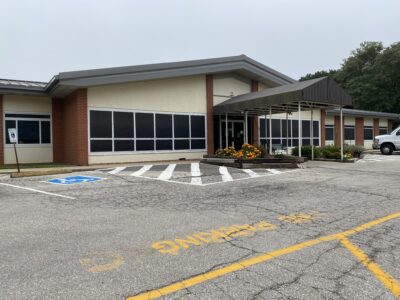Douglas County housing agencies team up with conflict resolution nonprofit to provide free mediation services for tenants and landlords

photo by: Austin Hornbostel/Journal-World
The Douglas County Human Services Building, 2518 Ridge Court, is pictured Tuesday, Sept. 6, 2022.
Two local affordable housing advocacy agencies have struck a new partnership with a Lawrence nonprofit specializing in conflict resolution, with hopes that they can work together to help prevent evictions before they happen.
They’ll try to make that a reality through free mediation services for tenants and landlords. The service is the product of a partnership between Douglas County’s Housing Stabilization Collaborative, the Lawrence-Douglas County Housing Authority and nonprofit Building Peace.
Gabi Sprague, Douglas County’s human services program manager, told the Journal-World Tuesday that she and Mariel Ferreiro, a finance manager and landlord liaison with the Housing Authority, collaborated to come up with the idea.
“We knew that mediation is a good way to navigate conflict resolution, and we know that this has been a resource nationally before,” Sprague said. “So we looked at getting some funding.”
They found that funding through the City of Lawrence’s Affordable Housing Advisory Board last year in April. Sprague said they’d first planned to simply hire a professional mediator, but Building Peace had come onto the scene as a new agency around the same time and they opted to partner with the fledgling nonprofit instead.
Since then, Sprague said it’s taken time to develop resources and an application for the program, so actually offering the services has only recently started to take off. It’s very much a pilot program from the HSC’s end, she said.
The nonprofit, for its part, has already been mediating other disputes for clients, from restorative justice work to conflict resolution between parents and adolescents. Nancy Kelley, a mediator with Building Peace and one of the leads for the nonprofit’s landlord-tenant mediation team, said mediation in any case generally can take anywhere from an hour to 90 minutes per session, depending on both parties’ needs, and can stretch across a few meetings.
“The sessions basically consist of us being facilitators for conversation between the two parties,” Kelley said. “And that opens up conversation and communication so they can talk about what their issues are, what was the problem to begin with.”
An added positive is that the mediation process begins quickly after a referral, Kelley said. Generally, the entire process can be finished within a few weeks. Compared to the court process, she said, it’s far less likely to become drawn out.
Even after mediation sessions, Building Peace follows up with clients. Kelley said if the parties come to some sort of agreement, the nonprofit makes sure to monitor that they successfully execute the agreement when deadlines come to pass.
The reasons for issues between landlords and tenants can vary widely. It could be anything from tenants being unable to pay their rent — or paying late — to the property not being taken care of in a way either party would expect. But Kelley said that in all of these cases there’s been a lapse in communication that needs to be addressed before things get desperate.
Kelley has supervised mediation for small claims court for several years, and she said mediators typically see landlord-tenant conversations as a chance to address things that otherwise might’ve been left unsaid if their grievances weren’t heard.
“It gives tenants the opportunity to have a little bit more power, more clout, than they would normally,” Kelley said. “… But it also gives the landlords a sense of community, I think. Landlords are offering a product, but really in our community, housing is such an issue right now. Landlords are on the front line of offering an opportunity for people to remain housed, so that is a strong point for me. It’s cheaper for landlords to go through mediation than it is to go through the courts.”
Sprague said mediation is a resource that’s meant to help both landlords and tenants, not just one or the other. She said she’d hope that if any landlords come across the resource, they’ll consider it as a viable alternative to end things in an agreement that’s beneficial for both parties.
Sprague said it’s hard to gather data on what qualifies as a successful mediation because it can look different from case to case. Kelley said that from a mediator’s perspective, it could simply be facilitating a productive conversation that may otherwise not have taken place between the two parties.
But the best outcome, Sprague and Kelley agreed, is intervening with mediation before disputes between tenants and landlords end up going to court. Year-to-date numbers on evictions in Douglas County aren’t out quite yet to provide a ballpark number to compare against and measure future impact. But Sprague said that in the first quarter of the year there had been about 70 evictions, not all of which had resulted in tenants being removed from their homes.
“Going to court should be the very last straw, because if people get evicted, it’s difficult for them to get other housing,” Kelley said. “… I don’t think that landlords understand the trauma they put families through by even threatening eviction. If people aren’t housed, it causes problems for the families, and those families have trouble; the kids certainly have trouble in school. It’s a problem for the whole community.”
Sprague said applications and informational brochures for both tenants and landlords are available on the Housing Stabilization Collaborative’s website.







